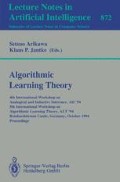Abstract
This paper includes some results on complexity of inductive inference for enumerable classes of total recursive functions, where enumeration is considered in more general meaning than usual recursive enumeration. The complexity is measured as the worst-case mindchange (error) number for the first n functions of the given class. Three generalizations are considered.
First: the numbering is computed in limit (with a fixed number of mind-changes). Then the complexity can be arbitrary fast growing recursive function. Second: a fixed number of functions are given by the enumbering function wrongly. In this case only universal strategies have large complexity function.
Third: every function given by the enumbering function can differ in a fixed number of points from the corresponding genuine function of the class. Two cases are considered: functions given by the enumbering function can be only partially defined or they must be total. In the first case there are unidentifiable classes. In the second case there are logarithmic algorithms for prediction and EX-identifying and linear algorithms for identifying of τ-indices.
This research was supported by Latvian Science Council Grant No. 9.599
Preview
Unable to display preview. Download preview PDF.
References
J. Barzdins. Limiting synthesis of τ-indices. Theory of Algorithms and Programs, vol. 1, Latvia State University, 1974, pp. 112–116 (in Russian).
J. Barzdins, R. Freivalds. On the prediction of general recursive functions. Soviet Math. Dokl. 1, 1972, pp. 1224–1228.
J. Barzdins, R. Freivalds. Prediction and limiting synthesis of effectively enumerable classes of functions. Theory of Algorithms and Programs, vol. 1, Latvia State University, 1974, pp. 101–111 (in Russian).
R. Freivalds, J. Barzdins, K. Podnieks. Inductive inference of recursive functions: complexity bounds. Baltic Computer Science, Lecture Notes in Computer Science, Vol. 502, Springer Verlag, 1991, pp. 111–155.
E.M. Gold. Language identification in the limit. Information and Control, 10:5, 1967, pp. 447–474.
A.N. Kolmogorov. Three approaches to the definition of the notion “quantity of information”. Problems Information Transmission 1 (1965), pp. 1–7.
P. Martin-Lof. On the notion of random sequence. Information and Control, 9 (1966), pp. 602–619.
H. Rogers, Jr. Theory of recursive functions and effective computability. McGraw-Hill, New York, 1967.
Author information
Authors and Affiliations
Editor information
Rights and permissions
Copyright information
© 1994 Springer-Verlag Berlin Heidelberg
About this paper
Cite this paper
Ambainis, A., Smotrovs, J. (1994). Enumerable classes of total recursive functions: Complexity of inductive inference. In: Arikawa, S., Jantke, K.P. (eds) Algorithmic Learning Theory. AII ALT 1994 1994. Lecture Notes in Computer Science, vol 872. Springer, Berlin, Heidelberg. https://doi.org/10.1007/3-540-58520-6_50
Download citation
DOI: https://doi.org/10.1007/3-540-58520-6_50
Published:
Publisher Name: Springer, Berlin, Heidelberg
Print ISBN: 978-3-540-58520-6
Online ISBN: 978-3-540-49030-2
eBook Packages: Springer Book Archive

